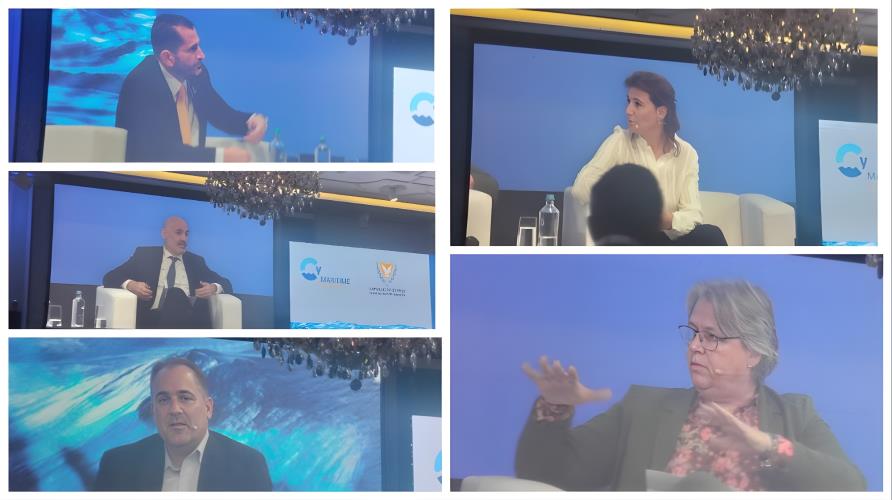Global shipping leaders gathered for a high-stakes panel discussion on the first day of Maritime Cyprus 2025, issuing a clear and urgent call for coordinated regulation, realistic decarbonization timelines, and investment in both technology and people.
Against a backdrop of rising geopolitical tensions, protectionist trade policies, and sweeping environmental reforms, the mood oscillated between cautious optimism and deep concern for the future of the maritime industry.
The panel discussion was entitled 'Navigating Disruption: Steering the Shipping Industry Through Global Turbulences.'
Opening the discussion, Thomas Kazakos, Secretary General and CEO of the International Chamber of Shipping (ICS) and former Director General of the Cyprus Shipping Council and the panel’s moderator described the current environment as “very terrible times,” citing disruptions from the war in Ukraine, ongoing Middle East tensions, and the erosion of international regulatory frameworks.
“Shipping is the lifepath of our modern world… We've seen increasing protective measures from tariffs to operational restrictions. This causes inefficiencies and raises costs.”
He warned that recent attacks on ships and increasing national protectionism risked destabilizing global trade.
The panel's central focus was on the IMO Net Zero Framework, set to be voted on within days.
Themis Papadopoulos, immediate past President of the Cyprus Shipping Council, emphasized that while the shipping sector is committed to decarbonization, it must be a globally coordinated effort:
“We cannot have a patchwork of different systems. Ships cannot pay multiple times for the same emissions,” he said, stressing the need for a single global regulatory environment, fair financial mechanisms, and reinvestment into the industry to support fuel transition.
Papadopoulos warned that without these elements, the initiative risks becoming little more than a carbon tax.
Karin Orsel, President, European Community Shipowners Association (ECSA), echoed the concern, revealing that a letter had just been sent to the European Commission demanding alignment between EU rules and IMO regulations:
“The EU must avoid any double regulation and double payment for GHG emissions,” she said.
Concerns were also raised about U.S. trade measures, including proposed tariffs and fees on foreign-built vessels. Joe Kramek, President & CEO, World Shiping Council warned that these policies were not only harming global trade but also U.S. manufacturers themselves.
“This more protectionist paradigm turns on its head the very reason U.S. maritime law was written,” he noted. “Tariffing inputs makes American goods more expensive to produce and export.”
He highlighted the confusion surrounding upcoming U.S. Trade Representative fees, particularly their potential impact on vehicle carriers:
“There's one U.S.-built vehicle carrier in service. The tariffs are across the board. This isn't helping U.S. manufacturers; it's hurting them.”
The panel voiced deep skepticism about the pace and feasibility of transitioning to green fuels.
Ioanna Procopiou, President Designate, BIMCO pointed to a study by ship classification society ClassNK, noting the massive gap between needed and available volumes of green methanol, ammonia, hydrogen, and electricity.
“It’s taken 40 years to build LNG infrastructure. Thinking we’ll have full global supply chains for alternative fuels in 10 to 15 years is a fantasy,” Procopiou said.
The panelists also noted many early adopters of dual-fuel vessels are now being penalized, which sends the wrong message to innovators.
Discussion turned toward human capital, with several panelists warning of an impending shortage of skilled seafarers, particularly those trained to handle alternative fuels.
“There will be a shortage of crew — especially qualified crews for new fuels,” said the BIMCO representative. “But how can we train for something we don’t even have yet?”
The panelists cited the risk of “over-burdening” current crews with new training demands for multiple fuel types, while Kramek stressed the urgent need to stop criminalizing seafarers.
“They're being detained for fires and illicit cargo they had no role in. If that happened on a commercial airline, it would be unthinkable,” he said.
While some panelists expressed optimism about the sector’s resilience, others warned of unsustainable financial pressure, especially on small- and medium-sized shipowners.
“We’ll see a lot of consolidation. That’s not good for competition or freight costs,” warned Procopiou. “Shipping works because there are many independent operators. If we eliminate them, it’ll be a disaster.”









